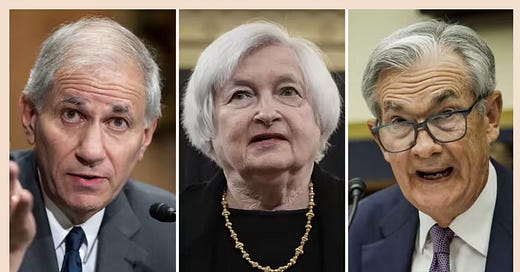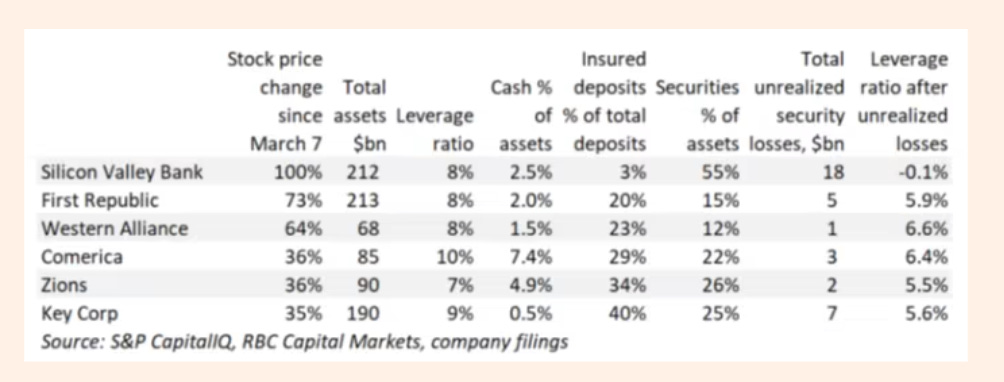Chartbook #201 Finance & the polycrisis #8 Venture dominance? The meaning of the SBV interventions.
At the weekend the Treasury, Fed, FDIC stepped in to stop developing bank run getting any worse.
Rob Armstrong at Unhedged has the list of the smaller banks that have been int eh crosshairs.
I am as much a sucker for a financial crisis-fighting story as anyone. But even I could not repress a horrible sense of deja vu and disgust at events over the weekend. Are the same people going to go on doing this over and over again: Tragedy, farce and then what? Zombie horror show? Of course the authorities should have seen it coming. If there are no resignations at the Fed, it will be a sign of the morbid state of the US governmental elite.
Was what the authorities in Washington organized a bailout? Not in the sense that the management at SVB, or the bank or the shareholders were saved. But Joe Weisenthal, Matt Klein and many othersm, rightly have little patience for that face-saving argument.
The crucial point is that an ecosystem of depositors was saved. And SVB’s depositors were in no regular sense, depositors. They are badly run and ill-advised businesses that for obscure reasons parked huge cash balances in a highly vulnerable bank. As Matt Klein remarks in his brilliant post at Overshoot the real problem at SVB was that its depositor was base was so “low quality” i.e. extremely prone to run with influence exerted by a small group of VC advisors. This was not so much classic large-scale bank in which mass psychology played its part on a grand scale, as a bitchy high-school playground in which the cool thing to do was to bank with SVB until it no longer was. As Klein puts it: “this was more a case of a “bank-run by idiots” rather than a “bank run by idiots”.”
It is those idiots that got bailed out. Why?
One could refer to the theory of financial dominance, which in the wake of 2008 argued that the Fed would ultimately face insuperable pressure from asset holders to step back from a high interest rate policy that inflicted losses on them.
But what happened over the weekend has a particular quality. On the face of it SVB is not a bank big enough to do systemic damage. That was the prima facie reason for exempting it from the oversight that extends to really big banks. Finance per se will not explain the emergency intervention.
But as should have been obvious all along SVB matters very much indeed, because its depositors are very powerful, very rich and very influential people who own a narrative that makes them indispensable to one vision of America’s future. And that force was brought to bear on the Biden administration over the weekend in an extraordinarily overt exercise of “venture dominance”
As Bloomberg reported:
SVB’s vast reach was laid bare to Joshua Frost, Treasury’s assistant secretary for financial markets, as he addressed a virtual audience of almost 1,000 venture capitalists and their portfolio companies on Friday evening. During a members-only Zoom call, representatives of the lobbying group National Venture Capital Association threw question after question at Frost, who would later that evening speak with FDIC officials. They implored him to consider the industry’s view when officials crafted a response. “The magnitude of what this industry is responsible for, and on behalf of the country, this is significant,” said NVCA president Bobby Franklin. “This is where the innovation happens.” The same day, some 20 private equity CFOs and executives with exposure to SVB jumped on a call. Some said that if it became clear deposits weren’t secure at smaller institutions like SVB, they would stop parking assets in them altogether, said a person briefed on the call.
The FT’s reporting on the same meetings exposes further piquant details:
Amid fears the government was prepared to let SVB and its uninsured depositors go to the wall, venture capitalists launched a concerted lobbying effort. They argued that it would not only have big economic repercussions, with companies struggling to write paycheques, but also that an outright failure would have geopolitical ramifications. “The theme was: ‘this is not a bank’,” said one person involved in the lobbying campaign. “This is the innovation economy. This is the US versus China. You can’t kill these innovative companies.” According to Brad Sherman, a Democratic congressman from California on the House financial services committee, the government became convinced that it had to take aggressive action to restore confidence after the failure of Signature. “One black swan is a black swan. Two black swans is a flock,” he said. “Once a second regional [bank] was shut down, this was systemic.”
This is what it looks like when the bourgeoisie in the true sense swings into action. It is what it looks like when an executive committee or committees constitute themselves and demand action from the state. It is highly reminscent of 2008 thought he specific sociology of Wall Street-Treasury relations in 2008 was rather different then from the Silicon Valley-Washington connection in 2023.
But as revealing as this is of underlying power relations should we be scandalized and lose ourselves in silly discussions about what is and what is not a “bailout”? Surely not. This is how financial capitalism operates. We know it.
As Yakov Feygin argues in a brilliant substack post.
The bailout is how modern capitalism deals with investment cycles through the state's intervention. And in doing so, the state assigns losses to someone. That's where the politics lie! This dynamic is especially vicious in the United States. As I like to tell my European counterparts, "America does social policy through investment and industrial policy." This means that the US has a very weak welfare state but is not a small state. The American government is very good at stimulating investment and cleaning up the consequences of bubbles. At its best, this makes the American economy extremely innovative and productive and creates many highly paid jobs and employer-provided benefits. However, at its worst, it leads to lost decades and massive inequality…. the tools we developed to do so were constructed in ad-hoc ways in response to lots of crises and learning by doing. Thus, what we don't know how to do as well is to apply these mechanisms in a way that is pre-planned and explicit in how it distributes the downside. This is where my friend Saule Omarova steps in! In her work with Robert Hockett and others, she has noted that the state is vital to the smooth functioning of the private banking system and its support for investment. So, she asks, why not make it official? Instead of an ad hoc bailout of real assets through a private financial system, which tends to be very indirect in its effect, why not have some public entities which can do the work directly? This is most explicit in work Saule, and I did together on a "bailout manager" whose job is to buy out the tangible assets of critical sectors facing bubble dynamics. However, this theme of recognizing the state's enablement of private investment and, thus, the need to have an explicit policy for managing the bailout and fallout of financial capitalism runs through all her work. And this recognition of capitalism's natural and normal functioning and how to make it more efficient apparently makes someone some raging Marxist...
Saule Omarova was the proposed candidate for OCC of the Biden administration who was red-baited in the Senate with a bipartisan coalition of credit unions and bank lobbyists blocking her progress.
I take Feygin’s proposal to be a diagnostic thought-experiment rather than a realistic proposal under America’s current political conditions. But it is indeed highly diagnostic and a useful political economy corrective to moralistic and legalistic arguments about the meaning of the current interventions.
***
Thank you for reading Chartbook Newsletter. It is rewarding to write. I love sending it out for free to readers around the world. But it takes a lot of work. What sustains the effort are voluntary subscriptions from paying supporters. If you are enjoying the newsletter and would like to join the group of supporters and receive the full Top Links emails several times per week, click here:





